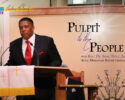“The Power of Prayer” (Acts 12:1-17)
Rev. Dr. Isaac Holt, Jr. | Royal Missionary Baptist Church
A hymn writer once said “O what peace we often forfeit! O what needless pain we bear! All because we do not carry everything to God in prayer!” This week, Rev. Pastor Isaac Holt, Jr. uses the story of Peter’s release from prison in Acts 12:1-17 to remind us that there this IS power in prayer. “Prayer is one of the most important things a child of God can do,” Pastor Holt says. “If you’re a child of God… prayer is mandatory. Prayer is a requirement. Prayer is the only thing demons respect. You are never at your strongest until you are bowed weekly on your knees.” We believe God with you that God is about to speak a word that is especially for you.






